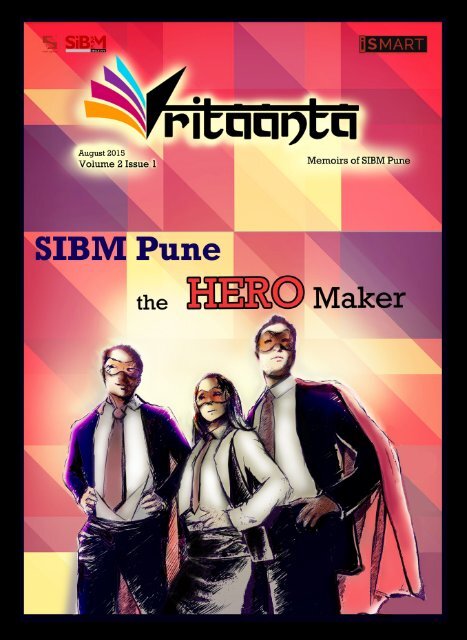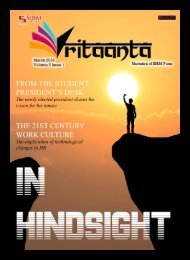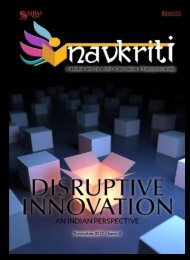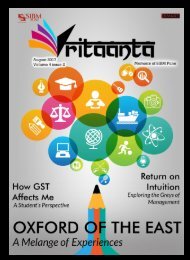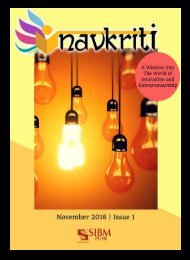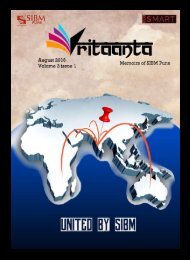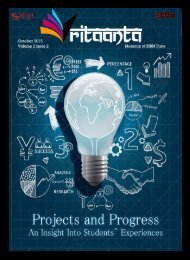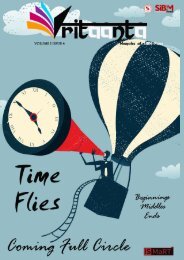Vritaanta Volume 2 Issue 1 August 2015
- No tags were found...
Create successful ePaper yourself
Turn your PDF publications into a flip-book with our unique Google optimized e-Paper software.
From the President’s Desk…It gives me great pride to write the editorial for this, the first issue of the second volumeof vritaanta — a very special issue as we begin a new academic year at SIBM Pune.This issue is dedicated to the opportunities this B-School gives us, and the students whohave capitalised on them in the past and will continue to do so in the future. ‘Hilltop Heroes’ brings toyou three of the many corporate competitions which were won by our students last year, and weretherefore launched from SIBM-P’s scenic campus this month — Mahindra War Room, Godrej LOUD,and ITC Interrobang.We’ve always prided ourselves on evolving with the times, and our curriculum is no different. Readabout the latest updates to the syllabus in ‘An Evolving MBA’. This up-to-date curriculum draws tothe institute a diverse and multifarious student population, featured in our story ‘Different Strokes,Different Folks’.As we welcome our juniors on campus, we see that they have already begun to find their feet and wintheir own laurels. Faced with their first-ever corporate case study challenge, a team of first-years(Aravind B, Mahadevan S, Nitin Nandan) joined their more seasoned seniors as campus finalists. Wefeature their journey in this issue, alongside the National Runners-Up of the Henkel Innovation Challenge— Samantak Bhadra and Subrajit Saha (MBA II Marketing).The Students’ Council at SIBM Pune is an institution in itself, and it is a matter of great pride to be selectedas part of one of the nine teams that constitute the Council. Sparsh Bhagat (MBA I Marketing)brings you the experience, from the perspective of the applicants, of the selection process.We also bring you some academic pieces, covering everything from branding and retail to matters ofthe economy. We strongly recommend the article by Prof. Manasi Phadke, SIBM-P’s beloved Economicsfaculty, titled ‘Greece-wale Bailout Le Jayenge’. A hilarious take on the Greece crisis! It’s nicelypunctuated by a comic strip on the same subject by Surbhi Prasad (MBA I HR), an Interim Teammember of iSMaRT.Ladies and gentlemen, without further ado, iSMaRT and the Students’ Council are proud to presentthe latest issue of vritaanta for your reading pleasure. We hope you enjoy it!Vishad ChaudaryPresident, Students’ Council, SIBM Pune
White White Collar Collar1Hilltop HeroesSIBM Pune has consistently produced dreamers, winners and achievers… and the tradition is set tocontinue for years to come.You thought getting into business school can we learn to adapt to our changing circumstance —was hard? Just wait until you step onto the first step in an education in business.this sprawling 300 acre, all-natural campuson a Hilltop.Saying No and Prioritising are KeyHeavy workloads and high expectations are just part ofUsed to working 50 hour weeks? Start preparing forthe pressure cooker for first years. The tempo can also90-100 hour weeks.be overwhelming – and it’s not just because of the academicload. “Little could have prepared me for the deli-Graduated near the top of your class? So did most ofthe members of your cohort. In fact, I’m sure you’re cate academic, social, and professional balance thatprobably muttering, “So much, so fast” after the first takes place at SIBM Pune. The number of activities andweek. Let me just say this: the pace doesn’t relent, events happening during any week is astounding”, admitsVaibhav Gupta (MBA I, Innovation and Entrepre-certainly not in the first gruelling year. One simply hasto adapt to survive.neurship). Indeed, saying ‘yes’ to most opportunities is a“The hardest part of business school is realising thateverything you thought you knew about prioritisation,mental stamina or your relative level of intelligenceis basically false. It’s humbling, but all too true.For instance I had to redevelop and adjust myselfreally quickly; all while being bombarded by the firstround of coursework this semester”, says ShreyasiMehta (MBA I, Marketing).Needless to say this transition leaves many shellshockedand riddled with doubt in the beginning. Thesooner this realisation occurs, the better and fastertemptation that most MBAs succumb to – initially, atleast. But one has to admit eventually that it takes a toll.“Saying aye to everything though can eventually catchup and leave you stretched way too thin at times”, saysSwati Gupta (MBA I, Marketing). To get by, many studentsmake trade-offs – ones that prepare them for difficultdecisions they’ll soon make when they return towork. After all every decision taken has an opportunitycost attached.Having said that, participation in such events does indeedreap rich rewards. There are behemoths that providethe opportunities for India’s best and brightestminds ranging from improving their strategising skills ina simulated ‘War Room’ (Mahindra & Mahindra), daringto dream out ‘LOUD’ (Godrej Industries) and case-studycompetitions such as ‘Interrobang’ (ITC Limited).<strong>August</strong> <strong>2015</strong>
2White CollarThe War Room by Mahindra & MahindraFirst commissioned in 2007, the campaign was spearheadedby Mahindra & Mahindra and rolled out to thetop Business Schools in India to create excitement andtransform perceptions, while attracting and engagingtop notch B-school talent to creatively respond to liveand realistic business issues through a fair and rigorousprocess of evaluation.These problems, faced by the top managers ofMahindra & Mahindra, are developed into sector-wisecase studies. Students form 4-member teams to solvethese challenging case studies and generate realisticsolutions in six months of intense planning and execution.The best team from each campus is flown down toMumbai, where they present their strategies to a jurycomprising Mr. Anand Mahindra, the Group ExecutiveBoard (GEB), and a distinguished guest list of eminentMahindra & Mahindra managers.“Don’t just look at the caselet from a participatory angle;instead look at the feasibility and implement-abilityof the solution you’re coming up with. That is what isimportant for any business. Mahindra & Mahindra givescaselets that are real business ideas and they can’t waitto implement all the ideas that come from the participantsof The War Room.”The gala National Finale is televised by CNBC TV 18, asa 3-part episode each year. This strategy contest hasbecome a cult brand in India's top B-school campuses,and students await the entire experience right from thelaunch till the Grand Finale.While Mahindra & Mahindra’s Top Team was launchingthe Season 8 version of The War Room right from ourvery own B-School and campus, we caught up withalumnus Anisha Saluja (MBA 2013-15, HR) from theteam that bagged the first prize last year called TheCenturions and asked her if she had any advice to givethe current batch, participating this year. She said,<strong>August</strong> <strong>2015</strong>
White Collar3Live Out Ur Dream — LOUD by GodrejGodrej LOUD is a platform that was set up for first yearPost Graduate students from any recognised B-schoolin India, to help them live out their biggest personaldream. That’s pretty much it. If you have a dreamwhich you cannot afford for yourself at the moment,Godrej sponsors it. The only stipulation being that youwon’t receive more than Rs. 1.5 Lakhs… so the budgetof your dream can’t be too far beyond that!Godrej has helped over 15 students achieve theirdreams and hopes to do the same again this year.Among them is Amrit Karan Singh (MBA II Innovationand Intrapreneurship) who said “Godrej takes LOUDvery seriously. I think the chances of getting selectedas a finalist increases manifold if you genuinely have adream and have been persistent in trying to fulfil it.”Speaking about the initiative, Sumit Mitra, Head —Group Human Resources & Corporate Services said:“Godrej LOUD is an innovative campus initiative toidentify passionate and creative young people who willbe the next generation of Godrej leaders. We feel thatencouraging dreams and partnering to bring themalive will be a win-win both for Godrej and these students.For the students, LOUD is not only exciting butalso personally enriching; and for Godrej, it is a greatway to create a talent pool of passionate potential employeesfor years to come.”This is your chance to articulate that personal dreamand then live it out. It's a win-win deal. And get a preplacement internship offer to boot. Talk about twobirds with one stone!<strong>August</strong> <strong>2015</strong>
4White CollarITC InterrobangInterrobang literally means a cool non-standard punctuationmark '?!' – intended to express both the interrogative(?) and the exclamatory (!). ITC Interrobang isan annual case study competition open to final-yearHR students. It is an initiative through which ITC engageswith students on campus as students learn howto critically analyse real world scenarios.Interrobang?! aims to provide students precisely thisexperience with ITC on campus — one where they canask/interrogate our leaders to seek insights into ourworld class business practices and be assured of the‘aha!’ moments through stories of challenges and successes.As a run-up to the event, ‘Interroquiz’, a dailyonline quiz is hosted on ITC's talent page on Facebook.Saraogi and Vrinda Khanna did the research and execution,while Saurabh Kumar was our Creative Head,”said Tarun Girdhar, our alumnus. (All four members ofthe team belong to MBA 2013-15, HR).“There is no reward that is, so to speak, tangible,” saysJayati Narula (MBA II HR), “of the extracurricular andno-academic-credit competition. The intrinsic rewardyou get from knowing you did a job well done can beso much more powerful – that is the Number 1 thing Ihave learned.”Is there a Formula for Success?It is not one ingredient. It’s a combination of havingdedicated students who are willing to make sacrificesand have the discipline to train, work as a team and tohelp each other and ultimately to care about winning.“We have collaborated with industry and governmentto understand the types of skills they are seeking whenstudents graduate,” said Dr. R. Raman, Director –SIBM Pune, “with programmes designed to cover allaspects of industry, including increasingly importantissues such as working with multiple stakeholders.”But the real value of such competitions is face-timewith experts. We have extremely well-educated, wellpositionedindividuals in communities who are nowspeaking out about what they believe their neighbourhoodshould look like, bringing the value of their MBAto full use in the real world.An institution that prides itself on encouragingstudents to participate in various such corporate competitions,SIBM’s students have proven their mettletime and again. Last year, Interrobang?! was won bystudents from SIBM Pune. The members of TeamSparx, with their excellent presentation skills and evidentknowledge of the ins and outs of the measuresthey had proposed. “We had divided the work early on,which ensured that we each had certain tasks to accomplish.I took on the role of facilitator, ShilpaTake the Risk; Make The Most Of Your TimeLet it be said that in the end: They made the most of theirtime at SIBM Pune – and they helped their peers do thesame. They transformed themselves, gained life-longfriends, and landed their dream jobs.Now it’s OUR turn to prove our mettle.And it can be summed like this: Be someone; before someoneelse becomes you.<strong>August</strong> <strong>2015</strong>
White CollarWhite CollarWhite Collar5An Evolving MBASIBM Pune has a tradition of updating its curriculum to meet the ever-changing needs of thecorporate world.Dynamic is a word that defines the moderncorporate world. What is trending to business or industrial enterprises but to all organitivemanagement is not limited in its application onlytoday maybe usurped in an instant tomorrow.Thus it has been SIBM Pune’s a Chief Executive or a Manager with the help of asations where the aim is to reach a given goal throughcredo to provide in depth insights into this con-group of workers.stantly trans-morphing world by readjusting its curriculumever so often.The ‘Management Lessons from the Gita’ course isan attempt to bring new perspectives using the BhagavadGita as the main reference frame for drawingout ideas from ancient Indian wisdom. The electiveswere chosen by keeping the broad vision of growthof Indian economy and future scope of globalisationin India in mind.If we look closely, the wisdom of the Bhagavad Gitacontains many leadership lessons that are similar tocontemporary leadership theories and practices. Itprovides, ‘all that is needed to raise the consciousnessof man to the highest possible level.’ Most ofthe management concepts like vision, leadership,motivation, excellence in work, goal seeking, workethics, nature of individual, decision making, planningetc., are discussed in the Bhagavad Gita. Effec-The elective, ‘Doing Business in India’ has been introducedin order to give an overview of key sectors ofbusiness in India and economic as well as environmentchallenges faced in them. The course syllabus alsocovers topics like employment law framework, socioculturaldynamics of corruption and cronyism, entrymodes and dynamics of Indian Markets.‘Indian Film industry: A Business Perspective’, is anelective which describes the current scenario of Mediaand Entertainment Industry in India. The key opportunitiesand challenges faced in Indian film industryneed to be studied with business oriented approach.There are a few threats like piracy in the Indian filmindustry, issues regarding copyright and cultural consonancewhich need be resolved with modern holisticstrategies. This elective comprises all such strategies,taught through a case study method.Apart from this, SIBM Pune has also adopted dual specialisationsystem from this academic year, where studentscan choose their major and minor specialisationsbased on their interest. It is SIBM Pune’s firmbelief that a dual specialisation provides students witha more customised opportunity to learn and imbibeaspects of management that they are interested in.<strong>August</strong> <strong>2015</strong>
6White CollarDifferent Strokes,Different FolksSIBM Pune is a potpourri of students from diverse educational backgrounds.Every year, thousands upon thousands of MBA make up the diverse student body at SIBM Pune.applications are submitted to and processed Students come here from various streams, includingengineering, economics, arts, commerce andby top MBA programs across the world.Many of these students will come from the management, psychology and even law. The presenceof ‘non-traditional’ MBA students amplifiesfield of business administration, commerce and engineering.In India, it is an observed trend that engineers the learning process, bringing in different perspectiveson the subject matter. Adding to their ownare very likely to pursue an MBA – whether it’s to find anew career path and break away from the faceless clutterin the industry; or to tackle the problem of market sets, their presence augments the learning experi-attitudes and opinions, and their own relevant skill-saturation and oversupply of similar skills by adding ence for the ‘traditional’ students as well.more to their qualifications; while some just hit an earlyEngineers from Mechanical, Chemical, Computermid-life crisis!Science, Electronics and Civil streams admit thatA ‘traditional’ B-School applicant usually has a Managementor an Engineering background, with work experi-growth, budgeting, funding and marketing eludethe intricacies of programme coordination andence in their line of work and a clear plan for where them. They have chosen to pursue their MBA tothey’re going. For them the process of settling into B- improve their skills and prospects, to become functionaland high-performing… not just in their workSchool and chalking out their career paths is certainlyeasier…it’s a logical progression in their careers.environment but in life.Now there also exists the non-traditional B-School applicant.The applicant may be a lawyer looking for valueaddition, a designer ready to apply a creative spin to theworkplace, a paramilitary officer with corporate dreams,a linguistic major with a passion to learn, a psychologyor hospitality graduate seeking opportunities in a newfield.Shashvat Mishra (MBA I Finance) is a practitioner oflaw in the real estate sector. He identified a needThese examples are just a sample of the stories that<strong>August</strong> <strong>2015</strong>
White Collar7for managers who can analyse project viability beyondits legal aspect and understand the complexity of thefinancial language as well. He saw that pursuing anMBA would help create or find new avenues. Similarly,students who come from the stream of arts also lookto venture into new careers and improve their jobprospects.Varun Dere (MBA I Marketing), a graduate in hospitalitymanagement says, “Coming from the hospitalityindustry gives me a more professional outlook towardswork, presentation and grooming.” ShashvatMishra points out that studying law provides the studentwith an improved analytical ability; after all,“Law involves studying the small details to see thewhole picture.”To a large extent, it’s a matter of perception – comingfrom a different career path and stream of educationcan be treated by the student as an advantage or disadvantage.One challenge that is clearly observable isadjusting to new subjects. Students agree that there isan initial struggle with subjects such as financial management,statistics and operations, but this can beovercome with hard work.Some challenges are more unconventional. GauravJain (MBA I Finance) is a Paramilitary officer and MarineEngineer. He finds coming to a civil college differentas he is used to wearing uniforms day in and out.However, he appreciates the rules and discipline atSIBM Pune, they make him feel at home.Akanksha Tyagi (MBA I HR), a psychology graduate,admits that she was impressed by the diversity of experience,intellect and perceptiveness at SIBM Pune.She sees her time here as a wonderful opportunity tobuild a professional network, through alumni and peergroups, to help her overcome the challenge that isnavigating the business world.Priyanshu Rana (MBA I Marketing), on the other hand,is a graduate in Fashion Technology. He is keen ongaining as much industry exposure as possible. So thatone day, he may learn to apply it in new ventures.Ultimately, it’s not about the course they’ve alreadystudied – it’s about the drive, the zeal and eagernessto learn more that has brought these diverse studentsto SIBM Pune. These students are prepared to pursuetheir MBA, coming together and growing to becomeinsightful leaders in their workplace and community.Akanksha TyagiShashvat MishraGaurav JainVarun DerePriyanshu Rana<strong>August</strong> <strong>2015</strong>
8White CollarHuman Capital:Worth its Weight in Gold!Rubaina Chauhan talks about the Indian industry’s perspective on important HR trends.Deloitte recently unveiled its Global Human Culture and engagement: The nakedCapital Trends <strong>2015</strong> report, outlining the organisationtrends HR can expect to see – and handle –In most Indian organisations, culture and engagementare considered as one time activity or inter-in the coming year. It is a beautifully written article anda must read for HR aspirants. I have added the Indianvention which are carried out periodically acrossindustry’s perspective on the important trends mentioned,to give students an idea of where the Indian in-the year as a calendar activity. A keen sense to developand nurture the culture and engagement of adustry currently stands.company is yet to be attained.Leadership: Why a perennial issue?Training and preparing the future leadership of a companystill seems to be a challenge for Indian companies.While, there exist many training programs, the focusand preparation has not evolved completely, with still alot of scope of improvement.Learning and development: Into the spotlightThe focus on L&D has certainly increased, with trainersfor both behavioural and functional trainings as well ase-learning content developers increasing over the country.This focus on L&D is here to stay as we are venturinginto newer domains and skillsets.Performance management: The secret ingredientWe as an industry are slowly moving away from ourfocus on performance measurement to performancemanagement. It is no more a bi-annual cycleof measuring an employee’s performance and potentialfor his/her hike and development. Rather,we have realised that a continuous developmentand performance plan is critical for a better performingworkforce.<strong>August</strong> <strong>2015</strong>
White Collar9Reinventing HR: An extreme makeoverThe need for HR to closely partner with the businesshas certainly increased over the years. Hence, it hasbecome vital for the HR fraternity to not only understandbut also add to the business of the company.As the organisations mature, so do their expectationsfrom their functions, thereby enabling the employeesto not merely accomplish their KPIs but learn anddeliver on business KPIs as well.HR and people analytics: Stuck in neutralIndia is still in a primitive stage of data analysis.While we deal with an abundance of data in our dayto day working, the real focus on utilising this dataeffectively is seen in very few industries. There arevery few jobs which actually entail data analysis pertainingto an HR function. But, the attention on dataanalytics and its benefits to an organisation will certainlyincrease in the future.Simplification of work: The coming revolutionWe see a trend in the industry where the KPIs of employeesare not only being reduced but also simplified.This results in not only better understandingand thus delivery on the KPIs but also reduces theload on employees who are chasing multiple KPIs. Inthe process of restructuring and resizing, complexjobs are being broken down into different JDs to establishsimpler and similar JDs for employees. Thistrend is here to stay as the focus on workforce efficiencyhas been increasing in the past decade.From the above trends, we can easily gauge wherewe stand vis-à-vis our global competition. There is alot of progress which is required and expected in theHR space. And thus, here’s to hoping that you will bea change driver as well.One Year Done!Rubaina Chauhan talks about the Indian industry’s perspective on important HR trends.It’s been a long time on the hill,Life is rolling smoothly on a wheel,We have begun again after half time whistle,Having been through the midterm hustle.The initial jitters are settled down,Normalcy returns back to campus at dawn,The year has started with a lot of trips,Memories of summers on the lips.The seniors have moved out to arena,As we continue the legacy on ARIMA,The new dreams and rigour joins us on campus,Willing to work and excel amongst the mass.The rest of the things remain the same,The times ahead, along with hope came.Things would soon start shifting towards celebration,With new goals and new aspirations.— Ravi Agarwal (MBA II HR)<strong>August</strong> <strong>2015</strong>
12 10Ground ZeroGround ZeroPune‖s Got Talent!Aarambh – a cultural event constitutes an important part of the initiation process for 1 st year MBA students.SThe 3 rd of ymbiosis June <strong>2015</strong> International may not be a very University important saw day a for congregationnew lives began. of talent It was for the day the that celebration the uninitiated of fresh the faces applause started their of the MBA. audience, And they the started students it in a of SIBMmost, but Whether for 38 it th is batch for the of SIBM thrill Pune of participation students, it was or the earningday theirgrand manner.‘Aarambh <strong>2015</strong>’ on Saturday, July 11, <strong>2015</strong>. It can unanimously agree that the participants put on awas an evening when the various institutes splendid show that showed the beautiful blend ofcould come together under SIU’s 'Vasudhaiva Kutumbakam'or ‘The World is one Family’ dictum to showcasediverse talent available at SIBM.Needless to say, the audiences’ cheers were aloudtheir talent and put on a show. Students from the sisterregardless of, the institute a team belonged to. Theinstitutes (SIBM, SITM, SIMC, SIT, SSBF & SSP) participatedin the program that included skits, dances, groupevent came to a close by 7pm, followed by a specialdinner for the students of Symbiosis.songs and homegrown musical bands.Aarambh is a once-in-a-year welcome event at SIU’shilltop campus that requires a mandatory mix of juniorand senior students in a group performance. The participantsof Aarambh are shortlisted from ‘Talaash’ which isa precursor selection round.The event which was organised through the efforts ofthe Co-Curricular team of SIBM Pune and the variousstudent teams from sister institute, was honoured bychief guest Dr. Vidya Yeravdekar the Principal Directorof Symbiosis and Society and Vice Chancellor of SymbiosisUniversity.Performances from SIBM Pune included a Group Dancecomposed of first and second year MBA students and aMusical performance, both of which were well receivedby the crowd. The entire affair had seen a record attendance,the crowd poured from their seats and cheerswere galore as the various teams battled it out for thecoveted title.December 2014<strong>August</strong> <strong>2015</strong>
Ground ZeroGround Zero1513 11Induction ProgrammeThe Induction process is a very significant part of the initial SIBM Pune experience.The 3 rd of June <strong>2015</strong> may not be a very importantday for most, but for the 38 thbatch of SIBM Pune students, it was theday their new lives began. It was the daythat the uninitiated fresh faces started their MBA.And they started it in a grand manner.The 3 rd began with an address by Padma Bhushan,Dr. S.B. Majumdar, the Founder and Chancellor ofthe Symbiosis Society. He greeted the new batchwith an inspiring speech that bid them a heartfeltwelcome. Slowly the anxious faces began to relaxand a few smiles began to show. Dr. Majumdar’sspeech was followed by speeches from Dr. VidyaYervadekar, Dr. Rajni Gupte and the chief guest, Mr.Prakash Iyer. By the end of the programme, the studentsfelt more at home, and indeed elated. Thespeech by Mr. Iyer had left them eagerly awaitingthe next day.The students became familiar with the college by theend of the first day. The next step was to get them toknow each other. For this they were thrown into thefray. The students had to participate in two minuteinteractions with each other and then put up a skit incompeting groups. Next, the groups had one night toset up a talent show production, which was presentedon the third day. By then, many a lifelong friendshiphad been made and the talent show ensured the entirebatch knew of each other.The 6 th of June was the fourth day of the induction.The students knew the college and each other so thenext step was to get them to understand their specialisations.To that end, recently graduated alumnicame in to speak and dispel illusions and give the studentsan idea about life after SIBM Pune. Varun Tejwaniof the batch of 2010-12 began the address withhis experience in Marketing. He was followed by DikshaSodhi, batch of 2009-11, who spoke about HumanResources. Finance was handled by Tarun Bothra,batch of 2009-11. The Operations specialisation wasspoken about by Hailey Kasbekar, batch of 2009-11.These speeches were very enlightening and reaffirmingfor many of those present.December <strong>August</strong> <strong>2015</strong> 2014
12Ground ZeroAfter a few days off to regain their wits, the studentswere sent on industry visits, which were especiallyhelpful for the freshers in the new batch. The studentswere sent to the factories of Piaggio, Coca Cola andBisleri.On the last day of the induction program, the 13 th ofJune there was a test on Financial Accounting, IT forManagement, Spreadsheets, Management Communicationand Quantitative methods. The subject matterhad been given to the students upon admission andthese tests would be counted in their final grade.The induction program was a streamlined affair thatintroduced the students to Symbiosis, one another,the MBA, the Industry and the subject matter, not tomention the pressure and precision of SIBM. All thestudents, who started out clueless, ended the inductionprogram prepared to face the joys and rigours ofSIBM.<strong>August</strong> <strong>2015</strong>
13Ground Zero Zero13 1325 Years LaterThe Silver Jubilee Meet celebrated 25 years of glorious existence by hosting the batch of 1990 for twodays of revelry.On one day, in the midst of high activity,when your phone rings, you wonderwhich issue has cropped up now. Onlyto be surprised the moment the callersays “Hi, I’m calling from the Alumni Team, SIBMPune”. Similar was the experience of the 1990 batch,when the Alumni Team @ SIBM Pune got in touchwith them to invite them to the Silver Jubilee Meet –celebrating 25 glorious years.It was undoubtedly a massive task, locating 60 peopleafter 25 years of their graduation and getting everyoneon board with the idea. The task would havebeen possible only because of Mrs. Namrata Pradhanand Mr. Satish Mandora who helped with thecoordination.All the anticipation came to a happy end when the“batch of the hour” arrived at Pune on July 3 rd . Backin 1990, the SIBM Pune campus was located at S BRoad. And so the event would have been incompletewithout having the chance to walk down the samecorridors that were once their own, and to sit in theclassroom which they did everything to avoid back intheir time.The highlight of the evening was the close-knit dinnerarranged with Col. George Judah, Director ofSIBM Pune at that time, the man who knew eachone of them and their mischief better than their parentsdid. That’s how day one ended, with memoriesbeing refreshed with every passing second.Day 2 started on a serene rainy morning, throughthe city, towards the hills, straight to the top. TheAlumni Team accompanied the batch of 1990 from SB Road to the Lavale campus at SIBM Pune. Back inthe auditorium, the session began with a welcomeaddress by the coordinator of the Alumni Team,Sasna Grace Varughese, followed by a formal addressby the Director, Dr. R Raman, welcoming thealumni to feel at home and extending a very warmwelcome. Then the floor was opened for interaction.And the batch of 1990 surprised us. Instead of takinga formal stance on the stage, they sat on the stage,facing their gleeful audience. Questions flew fromone corner to another, as did wisdom. All of themensured that every question was answered with atwist of live examples and anecdotes.The alumni batch felicitated two of the staff membersof SIBM Pune, who were present at their timeand are still very much a part of the SIBM family, Mr.Ankush Kolhe and Mr. Mukesh Thopte. They alsofelicitated the Director, Dr. R Raman, the DeputyDirector, Mr. Vinod Shastri and the Head of CorporateAffairs, Mr. Sandeep Bhattacharya. This wasNovember 2014<strong>August</strong> <strong>2015</strong>
14 12Ground ZeroGround Zerofollowed by a vote of thanks on behalf of SIBM Puneby Mr. Bhattacharya, and felicitation of the batch of1990. After a bunch of non-stop group pictures thealumni were taken to Vashishtha for a fun filled interactivelunch with a lovely cake and a sumptuous mealto end the two - day event.They were called here to relive and refresh theirmemories, and they went back with many more inturn. With the hope of remaining in touch with theirlost buddies, or the prospect of new adventures, it wasan experience that each one of us passing out of ourcollege must experience in life. Because no matter howold we become, we’ll always be crazy when we meetour friends. They get the best of you, out of you!December 2014<strong>August</strong> <strong>2015</strong>
15Ground Zero Zero13 13In the Spotlight!A tete-a-tete with some of our winners: — Samantak Bhadra and Subrajit Saha (MBA II Marketing),National Runners-Up Henkel Innovation Challenge;Aravind B, Nitin Nandan, Mahadevan S (MBA I) , Campus Finalists Xolo-Snapdeal Marketer of the YearHenkel AG & Company, KGaA throws upthe Henkel Innovation Challenge everyyear. In March <strong>2015</strong>, two MBA II Marketingstudents, Samantak Bhadra andSubrajit Saha went on to become national runners upin the Henkel Innovation Challenge 8. We conductedand interview with them so they could share their experiencesand advice.How did it feel to be national runners up for theHenkel innovation Challenge?SB: The Henkel Innovation Challenge is not the usualinvite-only B-School competition. It is open to anybody,from engineering students to aspiring managersand that is why we weren’t expecting to make a markin the competition, and yet we did! We felt amazedand this feeling of ecstasy hasn’t died yet!SS: It feels awesome to be national runners up for theHenkel Innovation Challenge 8, to present in front ofindustry stalwarts. There were so many participantsand we were the runners-up. It felt amazing.What was your idea?SS: Our idea for the challenge was in the laundryspace, since Henkel is already a major player in thelaundry segment. We tried to identify a gap in themarket. So we have washing powders in the marketbut we identified that there were no products in thedrying space.SB: Hence we thought if we could come up with aninnovative product that quickly dries clothes it wouldbe something that would be very attractive to theconsumer. Right now there is just the dryer, whichtakes time. So we came up with a machine that, withthe help of a biodegradable product which we did alot of research, would instantly and automaticallyget your clothes clean and dry. We called it InstaDry.What was your strategy for the final round?SB: The first thing we did was ensured that our presentationwas minimalistic. There were very fewwords on each slide and there were cartoons andfunny quips to ensure people didn’t get bored.SS: We started the presentation with a role-play todemonstrate the product and catch attention.SB: So the role-play was a very 70s-80s sort of thing,where a mother finds out that her son is covered indirt and bloodstains and the boy is slowly dying andcrying out “Maaaaa, maaaaa”. Then the mum comesin slow motion and holds the son, and then InstaDry<strong>August</strong> <strong>2015</strong>
16 12Ground ZeroGround Zerocomes in handy, it’s spilled all over the shirt and thenall the pockets of dirt and blood get cleaned instantly.That’s how we started the presentation. Then to addsome more flavour and wackiness to it, we addedsome musical elements. I played the ukulele andSubrajit was on percussions.SS: We had made a few jingles to support our presentationand we kept our final slide “For the love of Vienna”,because the final prize was to get to go to Vienna.Marketer of the YearFirst year students at SIBM Pune were fresh into a B-School and thrust into the fray of a B-School competition,the XOLO-Snapdeal Marketer of the Year. All ofthe students competed... but one team in particulartook the contest in their stride. The Rebel Alliance. Theteam comprised first year students AravindBalasubramanium, Nitin Nandan and MahadevanSM. Their specialisations were Operations, Operationsand Marketing respectively. After clearing the firstround and submitting their second round task, wecaught up to them.How does it feel to qualify for the Second Round?AB: It feels great! A couple of days in and we got thishuge win. It will give us a major confidence boost forall the following competitions. Also, it led to us becomingfamous overnight!What do you think you did differently?NN: We had an idea but we got very focused after havinga session with the Marketing Special InterestGroup, Mark-o-Polo. They told us to concentrate onone idea or the presentation would get diluted. We didjust that following the session, and explored all thefacets of our idea, keeping our presentation detailedbut focused.Tell us a little bit about your team.MS: Each of us had a different part to play. Aravindwas the motivator and driving force. He registered thegroup, kept motivating us and contributed the most.Nitin came up with the idea. We are here because ofNitin. He would keep debating and deliberating with usand that led to the idea’s birth. I handled the presentationsand the technical work. We stayed up nights,worked hard and thus we are here today.Give us a few details about your strategy.NN: The case said that a new product was being releasedand we had to find a market and a suitable campaignfor the launch. We went all out on the rural marketand online sales. We looked up Snapdeal’s expansionin the rural markets and came up with, if not anovel then at least a lesser researched method to promoteour product.What advice would you give to others to help themin their endeavours?MS: Work hard, be diligent and burn the midnight oil.It is as simple as that.The Rebel Alliance has joined Xombies, the team of secondyear SIBM students Aabir Chatterjee, Arnab Chakrabortyand Parth Doshi in progressing to the secondround. Aabir is a part of the Special Interest Group formarketing, Mark-o-Polo, and all three have been successfulin competitions throughout their first year. Perhapstheir successors have arrived!Aravind BMahadevan SNitin NandanSamantak BhadraSubrajit Saha<strong>August</strong> <strong>2015</strong>
PedagogyGround Ground Zero Zero13 17 13Greece-waale BailoutLe JayengeTaken from professor Manasi Phadke’s blog, which can be found at manasiecon.wordpress.comHere is the ultimate block buster in Economics.Isme action hain, drama hain, falls next to her hand and she pens “The public debtone bell actually swings so wildly in that wind that itausterity hain, reforms hain, growth of a country wishing to join our big EU khandaanhain, depression hain. There are scams cannot be more than 60%.”galore and bro-mance to boot! How could BollywoodMusic. The title of the film gets displayed. “GreecewaleBailout Lenot move in to create a movie?Jayenge”.The dukhiyaari Maa-stricht treaty, clad in white, witha dab of dirt (with a radius of exact 2 mm) on her rightcheek and just relieved from her job of stitchingclothes non-stop 24×7, is standing in the veeraan, sun-saan Kaali Mata temple, wondering why in eternitythey got her here to write all the entry level criteria.“Damn, I hope I have connectivity. And this darkcave is spooky…how do the Indians get any of theirjobs done” she mutters. “Hmm…The public debt ratioof a country wishing to join our big EU khaandaancannot be more than 40%” she thinks of writing whensuddenly it becomes windy.Whhhhhooooooooooo. The little light flame at thecorner of the temple suddenly dies out. The bells suddenlystart ringing around her, driving her crazy andStarring Alexis Tsipras. Angela Merkel. Francois Hollande.And in a special role, Dr. Manmohan Singh.Cut to Greece. What! The public debt must be 60%!But ours is 80%! And we simply HAVE to enter theEurozone. Nahitoh ye samajkyakahega, Maa-ji!And so Greece approaches the other members andpromises to deliver on the 60% target. “DoctorSaab, aap operation ki tayaari ki jiye, main paisonkaa intazaam karta hoon”.Well, now that intazaam bit happened “Chupkechupke” when Goldman Sachs arranged some greatderivative products to create better Governmentaccounts where there were none. Nahiiiiiiii, cried theMaa-stricht, but the beta and alpha in Greece paidno heed to her.In 2001, Greece is finally declared fit to enter the Eurozone.Chak de! In the next sattar minutes ahm, Imean, the next 70 months, from 2002 to 2006, itgoes on a growth spree unlimited and is the secondfastest growing economy in Europe. All fundamentalslooking bright and wonderful. Its all new, muscularform causes wonder in the market. This Bhai<strong>August</strong> <strong>2015</strong><strong>August</strong> <strong>2015</strong>
18Pedagogylooks unbeatable. “Ek baar jo maine commitment karli, phir main apne aap ki bhi nahi sunta.”However, some problems are emerging already. Backgroundscore changes from major to minor chords,even as minor issues threaten to become major scams.The fiscal deficit is very high, tax revenue is dipping,CAD is emerging but the Euro is getting stronger.There are mutterings about these issues through theglobe. But such worldly matters as people talking behindtheir back don’t upset our philosophical Greeks.Ramesh Babu says Pushpa…“Kuch toh log kahenge, Logon ka kaam hain kehena….Kuch reet jagat ki aisi hain, har ek subah ki sham huiTu kaun hain tera naam hain kya, Seeta bhi yahaanbadnaam hui…”2008-09The sub-prime happens. Greece now in trouble.Ramesh Babu and Pushpa give way to Rahul and Anjali.Karan Johar sees an irresistible opportunity for atear jerking moment in a crazily opulent country. Afterall, bade bade deshon main, aise chhoti chhoti baateinhoti rehti hain. Greeks are crying softly into their pinkbranded handkerchiefs because they got only a 123%raise in salary. Shah Rukh Khan and Kajol (dressed inan unbelievably gaudy sari with an 8 feet long pallu) flyout in a helicopter straight from the Colosseum, wherethey apparently live, singing..“Sab hain tere karam, kabhi khushi kabhighammmmm….”2009-11EC comes in to offer a bailout package. Greece defiant.Amitabh-style, Greece says “Main aaj bhi pheke huepaise nahi uthata.”Enter ECB and IMF, Munna and Circuit. “Tension nahileneka, sirf dene ka.”Greece takes them literally. Only takes loans and givessleepless nights to the others. Refuses to carry out austerity.Fundamentals worsen. “Arre, isse toh tej bookhaarhain!”Angela, torn between anxiety and fury,starts thinking of pushing Greece out of theEuro.”Driver, Gaadi roko!” George Papandreou, thePM of Greece now seriously upset and bugged. Beltsout the classic “Maarne wale se jyaada, bachaanewallakai jyaada bada hota hain, Angela behen.” AngelaMerkel, having being called behen first time in her life,gets unhinged and is tempted to tie the rakhi and sob“Tum mooh haath dhokar aao, main khana lagwaatihoon. Maine tumhaare liye gaajar ka halwaa banayahain.” But the German discipline wins and austerityprevails.2012-15New PM Samaras tries the softer approach to woo theGerman lady. A bit of Ghazals can work wonders onthe toughest of hearts, after all…“Tum kodekhatoh ye khayalaayaaJindagidhoop…tum ghanachaaya”He would love to stoop over backwards to try the austeritythat Angela is suggesting. But, aah, the khursisaga does not quite allow him the luxury…“Aaj phir dil ne ek tamanna kiAaj phir dil ko humne samjhaayaa….”When asked harshly to get all fundamentals in orderand repay back the Paanch Rupaiya Baaraa Aana, thisJagjit Singh offers…“Hum jise gungunaa nahi sakteVakt ne aisa geet kyun gaaya”<strong>2015</strong>PM Alexis Tsipras in a crazy situation. The man is votedto power believing that he will never push austerity onthe Greeks. But the Troika wants commitment to austerityand won’t release funds. “Main kahaan hoon,” hemutters weakly, wondering how things ever got socrappy. Even when the Greek referendum reveals thatpeople hate all kinds of austerity measures, Tsipras will<strong>August</strong> <strong>2015</strong>
Pedagogy19have to toe the line, else the banks face death. Merkelunrelenting. She says that not only will Greece have topush in reforms and austerity measures, but Germanywill not be willing to write away any part of the debt atall. They will claim their entire pound of flesh, ifGreece is to be given a chance to be an Euro member.What a poignant situation, one filled with helplessnessand a sense of pathos. I only have Mirza Ghalib to offerin this Guru Dutt moment. I am sure even Ghalibwould have never quite imagined how very apt hismasterpiece would have been to describe this stalematethat Tsipras faces….Tsipras to Angela…हरएकबातपेकहतेहोतुमकीतूक्याहैतुमहहॊकहोके येअॊदाज़ऐगुफ्तगूक्याहै?On the zero capacity to repay the loan…चिपकरहाहैबदनपरऱहूसेपैराहनहमारहजेबकोअबहाजत-ऐ-रफू कयाहै?(The clothes stick to my body thanks to the blood…When the whole body is bleeding and hurting, is therea need to be worried about darning the torn pocket?)On Merkel repeating again and again how she willNOT write off any of the debt…जऱाहैजजस्मजहाॉददऱभीजऱगयाहोगाकु रेदतेहोजोअबराखजुस्तजूक्याहै?Last scene. New Delhi. Greecewaale Bailout Le Jayengehas released and has been declared to be a coupby Twitter. Dr. Manmohan Singh is watching TimesNow in which Arnab is demanding answers from completelybewildered BJP leaders as to why Greece is in acrisis. On BBC news, Tsipras is entering the negotiationswith a grim looking Hollande and Angela Merkel.CNBC shows Greek stocks plummeting.“You should never enter negotiations with such determinedwomen,” thinks Dr. Singh to himself with ashudder. Just thinking of Madam and Amma and Didicauses him mild anxiety attacks. “Had he asked me,I’d have told him exactly what to do…”Smiling mildlyto himself, he switches the movie on silent mode andgoes back to his book. “The Being of the Beautiful.”By Plato.<strong>August</strong> <strong>2015</strong>
20PedagogyPrateek KakkarSahil BhavnaniA research paper on ‘Effect of ’Green’ Messages on Branded Clothing over Purchase Behavious andVedant AhirBrand Rejection in Indian Consumers’, by Prateek Kakkar, Vedant Ahir, Sahil Bhavnani (MBA IIMarketing), under the guidance of Dr. Mallika Srivastava (As st Prof, SIBM Pune) was published inthe International Journal of Business and Administration Research Review. Read the Abstract below,and the rest of the paper at http://www.ijbarr.com/downloads/0207<strong>2015</strong>1.pdfGreen messages or “Green” brands are those ‘green’ products are preferred to normal productsproducts known to be softer on environmentwhen used or manufactured. These(Vandermerwe and Oliff, 1990; Gordon, 2002).To overcome product commoditisation in the market,are products with natural ingredients, organicelements and do not deplore natural non-the marketers often attach the ‘green’ attribute totheir product so as to differentiate from the rest. Theyrenewable resources when manufactured. American MarketingAssociation says, ‘green’ branding or specificallythink that this new point of difference will help in gainingthe essential attention while a purchase decision is‘green’ marketing are done to project environmentallybeing made (Sharp & Newstead, 2010).safe products.Despite the above measures by present day marketers,we observe that majorly “green brands” liveThus green marketing includes:uponAltering the product; Process Redesigning; Change inPackage Material; Tweaking Advertising―Green‖ is the NewBlackThe visible effects on global climate of exponentially burgeoningindustrialisation have made companies and consumerssensitive to environmental concerns (Douglas2006: 458). Now it has become the onus of businesses tocontribute in sustaining the mother earth for the sake ofthe civilisation and yet be profitable. The businesses needto become ‘green’ businesses (Porritt & Winner 1988).These days, many consumer goods in the market are beingmarketed with ‘green’ messages. The reason for sucha move by FMCG/FMCD companies is the notion thatmaking the consumer perceive that their product is softon environment will help in gaining acceptance. Anda very small market share. ‘Green’ products are perceivedto be either of very high cost or as niche productsfilling the gap of a limited customer base (Pickett-Baker & Ozaki, 2008; Vandermerwe & Oliff, 1990;D’Souza, 2004; Charteretal., 2002a, b; Gordon, 2002).It may be a possibility that attributing the product as“green” invokes such associations in the mind space ofthe customer. Therefore, it is essential to study thereason why these “green” brands share a smaller marketspace.<strong>August</strong> <strong>2015</strong>
Pedagogy21Reaching Out ToConsumersAn article on Omnichannel: The New Buzz in Indian Modern Trade.Indian Retail has shown an amazing transformation inthe last decade. Urbanisation, more disposable income,FDI in foreign retail and attitudinal shift amongcustomers have changed the face of Trade. BCG recentlypredicted that Indian retail would double to $1trillion by 2020, from $600 billion in <strong>2015</strong>.Before the big retail players came to India, the retailsector was largely unorganised. In 2014, the overallcontribution from this sector was 90%, with only 10%from modern trade. A recent report from BCG showsthat Modern Trade shall grow threefold by 2020,while traditional retail will grow around 10% in thesame period.Improvement in Supply, Brand Awareness, Digitisation,and Brand promotion have been some of themajor factors for such tremendous growth estimatesfor Modern Trade. Lean Manufacturing, lower Stock,Multi-Channel Supply, Muti-Brand retail outlets, variousoptions to make payments, and delivery of goodspurchased combine to contribute to the success ofmodern trade.However, as customers evolve, so do their needs forsomething innovative from retailers. They want theretailer to be present on every channel and to integratethese channels. They want to order somethingonline, pick up these things from retail outlets, andpay via app. He wants to see the same promotionsoffered on all channels.Companies like Tesco, IBM, Walmart etc. have successfullytamed this new beast of success. In India,Adidas has taken a small step forwards. At stores inChandigarh and Delhi, they provided a tablet toplace orders, if a particular SKU is not available instore. Adidas has around 5000 SKUs, but in-store donot stock more than 700-800 SKUs on average.These initiatives keep customers in contact with thecompany. Initially, it costs a company to changetheir existing system of delivery. But real-time dataprovided to retailers creates a huge impact on salesincrement. Store Pickup, Interactive Aisles, StoreLocator, Check Store Inventory, and Product Comparison…all these could be done in real time.Picture the delight of the customer when the retailergreets him by his name on the basis of profile informationgathered through online platform andshared at all the channels. These sales channelswon’t work in silos then. Every channel will be as importantas other. Information gathered at one channelwill help the other channel to convert a customer,with less effort.-Varun Garg, MBA II Marketing<strong>August</strong> <strong>2015</strong>
22PedagogyAn article by Juhi Agrawal on the possible aftermath of Fed Rate hike on emerging markets.The Federal Reserve System popularly known In most of the emerging markets such as India, Africaas the ‘Fed’ is the central banking institution and Latin America the share markets are heavily dependentupon FII’s. This is because the people of theseof the United States of America establishedon December 23, 1913. The weight of the entirebanking system of U.S. lies on the strong shoulders stock markets. In India, the largest democracy incountries are very much reluctant to invest in thetheof the Fed, the responsibility of the entire financial structurelies in the capable hands of the Fed and the fates ofthousands and lakhs of investors around the world lies inthe decisions taken by the Fed. However the journey wasnever very smooth. The Fed was preceded by the FirstBank and the Second Bank of U.S. which were not verysuccessful. Then finally as and when the Fed arrived,things began to change drastically and even till date itrules the banking system of U.S.A.The provision of cheap credit has two major effects onthe American economy. Firstly, there is a lot of liquidityin the market as cheap credit is easily available and secondlypeople are reluctant to invest in the country as theyare lured by the high interest rates in other countries.This is good news not only for the investors but also forthe emerging markets where this money is poured into asthe industries and the corporate sectors are hugely dependentupon this flow of funds. These investors are referredto as the ‘foreign institutional investors’ (FII’s) andhave been granted special privileges such as non- applicabilityof MAT. The investments are made in the capitalmarkets and the money ultimately reaches out to thecorporate world.Fed Feeds FuturePowersworld, a country of 1.25 billion people, only 2 lakh peopleinvest in the stock markets. Such marginal participationmakes the emerging markets shaky and vulnerablefor the domestic investors.These foreign investors are lured towards emergingmarkets because of lower interest rates by the FederalReserve but now talks and lengthy deliberations aregoing on amongst the moguls of Fed Res to increasethe interest rates. Since years Fed had kept the ratesnear zero but cheap credit led to excessive demandwhich in turn led to inflation. The rates are expectedto be hiked towards the end of this year or later. JanetYellen has indicated that the effect shall not be feltmuch. However if the hike is done earlier or more thanexpected then the markets might react sharply. Forthe current year, FII investments in equity marketstood at 93000 crores. Now there are high chancesthat this hot money might soon leave the country.<strong>August</strong> <strong>2015</strong>
Pedagogy23When the foreign investors are rejoicing, the emergingmarkets are brooding over their future. The stockmarkets have already begun to show negative signals.Due to increase in interest rates, the value of dollarwill also increase against the currencies of emergingmarkets which will increase the chances of more andmore money leaving the shores. Currently even theRBI has embarked upon reducing the interest ratescutting 25 bps twice but now the increase in rates byU.S.A. will diminish the arbitrage benefit.It is very popularly known that whenever U.S. catchesa cold the entire world sneezes. Same is the case withthe Fed. Whenever Fed changes its policies entireworld is affected in some way or the other. Even thenews of interest rate hikes sends jitter down thespines of the emerging markets as they are consideredto be the riskiest. Fed reserve rate hike was firstannounced on May 17,2013 and between June andaugust 2013, FII’s took out 230 billion rupees from theshare market, dragging the Sensex down by 10 %. Therupee was also collapsed losing 27 % in 3 monthswhich forced the RBI to take emergency measures.Now it is expected that the Fed rates shall reach 3.25to 4 % by 2017-18. However the Fed is going to be extremelycautious regarding the rates. Depending onthe market situation, it might even pause, slow down,speed up or reverse its course of action.Now when everything has been said and decided, themost important question is ‘when’ and not ‘if’. Thetiming shall play a very important role. Fed GovernorJanet Yellen has been consistently dovish and supportiveof loose monetary policy. In a nutshell, there aretwo sides of this coin. If the rates are not hiked there isrisk of unwarranted inflation and if they are hiked itmight stall the growth of the economy. The timingcan be the game changer or the game spoiler.The emerging markets that are expected to be affectedare Asia, Africa, Middle East and Latin America.History stands witness to the fact that these areashave been affected drastically in the past. Examplesinclude Latin American debt troubles in 1980’s and theMexican ‘Tequila crisis’ of 1994. In 1993-94, a 2.5%hike in U.S. long term bonds took the emerging marketsby surprise and as a result the world saw anothercrisis- the famous ‘Tequila Crisis’.Countries in Asia are in a much better position to absorbshocks than they were in 1990’s during Asian crisis.In fact they are in a much better position than 2013when talks of fed rate hike tapered off the markets.India is quite insulated and even Korea seems to dowell in case of Fed rate hikes. Even in 2003-06, whenthe U.S. had raised the rates of its treasury bill by1.8%, Indian markets had grown by 17%. This analysiscan be bolstered by the fact that this year even MorganStanley dropped India from the list of Fragile Fivewhich was a matter of shame for Indians. (Fragile Fivereferred to those nations which were most vulnerableto Fed policies). IMF chief Christine laggard said thatIndia is well established to face the crisis. Even RBIgovernor Raghuram Rajan said that there will be volatileeffects but India is well prepared to deal withthem. Economically, Korea and U.S.A. are quite connected.So the positives shall definitely outweigh thenegatives and shall not pose to be a problem. It is verymuch true that currencies do move in response to externalshocks but then it’s a matter of a few monthsand then the effect shall die down.Now whenever the Fed raises its rates, the charts andthe stock markets are going to react differently. Somemay fall some may shoot up. The emerging marketsare expected to perform better and to remain morestable. At the same time, such crisis might happen atanytime. So what is it that we should do to counter it,to fight it and to conquer it..??? The domestic investmentsshould be boosted up. This one small step canchange the face of the entire stock market of theemerging markets and this step is required to betaken soon, very soon.-Juhi Agrawal, MBA I Finance<strong>August</strong> <strong>2015</strong>
24ZeitgeistDon‖t tell people yourdreams. Show them!Taken from the Director’s blog - Divya Bhardwaj shares how coming to SIBM was the right choiceThey say “Answers lie within you, make sure believed in me when nobody else did. I also had anyou end-up where you belong”. The journey excellent group of friends around me. I would be nostarted two years ago, when the yearn to one but for these people. So my first insight is tounderstand and passion to learn the other surround yourself with the right people and your jobside of world advanced within me. The gap and urge to is half done.be the part of a league was strenuous to bridge. I decidedto give it my all, for it is going to be now or never.The journey was extremely taxing, as I hardly used totake-out time from the dreary, juggling work, which wasmy high-priority. I was performing well on the job front,but I was not reveling in it. I realised that the time hadcome to make the most imperative decision of my life. Ithought hard and bravely, I decided to work hard andfight out against all odds to be part of the best B schoolin India.I started preparing for the entrance examinations duringthe first year of my job, but despite slogging day andnight, I barely managed to get 88 percentile as my SNAPscore. It was indeed a set-back, but I realised somehow,that there is still more to put-in before I could realise mydreams. As now I hold, when you are competing forsomething, it is never good to feel contended.After investing two years of efforts, the day arrived,Eventually, I arrived at SIBM pune, on 2nd June,<strong>2015</strong>.My dream was realised. The redemption was complete.But my experience had taught me that this is just theoutset. Looking back, my parents were a huge supportfor me. They stood by me through thick and thin. TheyThey say Everyone has an ego. At some point, yourego gets hit. The sooner it gets hit, the better for youMine got hit in 12th standard. What was till then aninfallible impression, got dashed overnight. I havelearned an influential lesson in life: “You are inferiorto none. You are superior to none. The moment youstarted thinking yourself as superior to someone youstart losing, similarly the moment you start thinkingyourself as inferior, you start giving up”.I would like to conclude by the enduring words ofEleanor Roosevelt-“The future belongs to those whobelieve in the beauty of their dreams”, arouse yourlight, manifest your dreams. Realise your worth !- Divya Bhardwaj, MBA I Marketing<strong>August</strong> <strong>2015</strong>
Zeitgeist25Student Driven College– Experienced!in us (MBA I). Then they are bombarded with ques-Sparsh Bhagat (MBA I Marketing) talks about the student council selection process.So it’s SIBM, yeah SIBM Pune. Always tions some clever, some whacky and some relevant.known as the student-driven institute, The curiosity among the cream of the country waseasier said than done. When you hear the good to witness.words, you comprehend just the literalFollowing which we filled a preference, as to whichsense of these words. But it means a lot more onceteam we'd want to join. Then begins the first round ofyou are a part of SIBM. So here I am, scribbling thethe interview. This is where the real deal begins.experience, taking you along on the journey, an enthusiasticwriter.Started post 5pm and trust me when I say this there isno closing time. My friends actually came backI came into the system with expectations of hardships,fun and learning. As an outsider, I alwaysheard that in an MBA one is very busy, one doesn'tget to sleep, at least five parallel things go on, etc., itall sounded too flashy to me. But it indeed is. Howeverthe satisfaction it still gives is immense.Fast forward to the Students’ Council selection experience.All the students gather in the auditoriumand the President of the Students’ Council announceseach team and all 9 teams introduce themselves.Sheer professionalism! One after the otherthey introduce themselves, with an epic video shoton campus by the team themselves… with the messageof what they do and what they are looking for,at 5am. (Welcome to a student-driven B-School!) Firstround was followed by tasks such as get 20 friends in30 minutes. Other tasks were arrange a car, arrangefor quotations for print, make action plans, etc.This was further followed by a second round for shortlistedcandidates. It involved some brainstorming inteams to get a task done. Finally, the third round ofinterviews, this time they check how good a teamplayer you are, by asking you to tell pros and cons ofyour peers. (Be subtle!) And at the end, comes the dayof results. The Interim Students’ Council is ready togive it their 100%. But this is really not the end; trulythis is where it begins.All in all, a unique and creatively designed process,that helps a candidate to learn a lot of things that willhelp not just in an MBA but in life in the long run. A lotof credit goes to seniors and the Council for designingan incredibly well-thought selection process. Lookingforward to the Junior Team selection process in a fewmonths!— Sparsh Bhagat, MBA I Marketing<strong>August</strong> <strong>2015</strong>
The sights and sounds of SIBM Pune…Through the Lens with (from top left, clockwise)Varun Rao (MBA I Marketing), Simranpreet Kaur (MBA I Marketing) (2 snaps), and Himadri Das (MBA II HR)
Welcome to the InterIm StudentS’ councIl of SIBm puneWishing you all a great tenure


